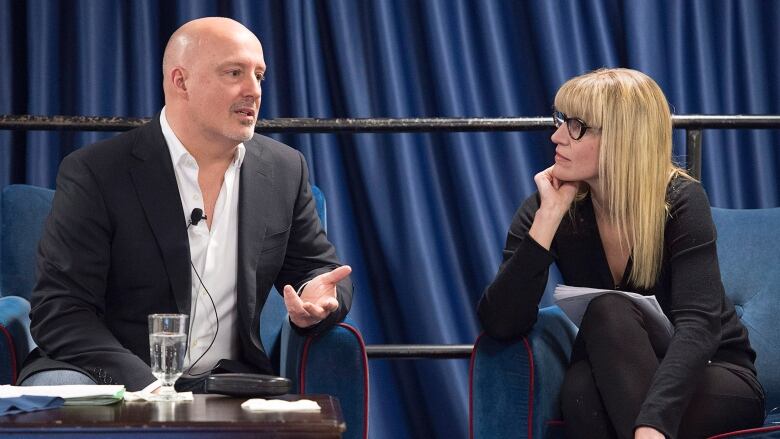Marijuana myths, effects on teens probed by panel in Halifax
Canadian Centre on Substance Abuse kicked off a 4-city tour in Halifax

At a Halifax skate park last summer, Philip Tibbo's14-year-old son was told by a group of older teenagers that marijuanais natural and no harm would come of using it.
It's one of many myths about cannabis circulating amongst Canadian youths today, said Tibbo, a professor at Dalhousie University's Department of Psychiatry.
"I asked him if many people were smoking (at the skate park) today. And he said, 'Yes, but they're all saying it's harmless. That it doesn't do anything to you'," said Tibbo.
"So I put on my best parental face and prevented myself from pulling the car over, pulling out my laptop and doing a presentation on it. It's amazing that myth is out there."
The Canadian Centre on Substance Abuse kicked off a four-city tour in Halifax on Friday intended to debunk myths about pot and warning about the effects of the drug on young people.
Impact on the adolescent brain
The tour comes a month after the Liberal government's Decemberthrone speech in which it pledged to "legalize, regulate andrestrict access to marijuana."
Tibbo, who contributed to a report released in June aboutcannabis use in adolescence, said research indicates the risks aregreater for teens who use marijuana because their brains are stillin development.
"The adolescent brain is going through so many moredevelopmental processes and the whole endocannabinoid system isresponsible for those processes, so then if you get regular cannabisuse into that system, it can have deleterious effects down theroad," said Tibbo at a Halifax convention centre.
"We need to get that message out."
Sherry Stewart, a professor at Dalhousie's Department ofPsychiatry Psychology and Neuroscience, said there are manymisconceptions among youth about cannabis, including that allteenagers smoke weed.
"In relation to what youth think, that everybody is doing it,the statistics clearly show that's not the case," said Stewart,
citing the 2013 Canadian Tobacco, Alcohol and Drugs survey resultsfor 15- to 19-year-olds.
"Around 75 to 80 per cent of youths are not using in the pastyear. So that creates a social norm where youth think that everybodyis using it, so why wouldn't I do, when it fact, it's not themajority that are doing it."
Calls for more research
The report from the federally-funded agency said regular cannabisuse early in life can result in behavioural and cognitiveimpairments, such as poor academic performance and deficits inattention, information processing and memory.
However, all the experts noted that more research needs to bedone on the effects of marijuana on youths and adults to betterinform future policies.
Sabina Abidi, a child and adolescent psychiatrist at the IWKHealth Centre in Halifax, said she hears myths about marijuana everyday working with youths with psychotic disorders and schizophrenia.
"A large number of our populations of kids use cannabis, oftenin harmful ways," said Abidi, who attended the panel discussion.
"Talks like this help with our education. Already we arestrategizing around how we might be able to implement some of theinterventions they discussed."
Future panel discussions are scheduled for Feb. 3 in Toronto,Feb. 12 in Vancouver, and Feb. 22 in Ottawa.












_(720p).jpg)


 OFFICIAL HD MUSIC VIDEO.jpg)
.jpg)



























































































